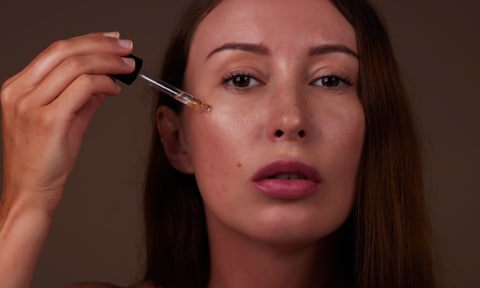
What are the potential benefits of succinic acid in skincare?
It may help combat acne, promote skin healing, and address various skin issues, all without relying on harsh chemicals
Over the past few years, the beauty and skincare industry has experienced a rise in demand for natural and eco-friendly ingredients. Among these, succinic acid has shown promising potential in providing various benefits to the skin.
Many people are looking into the potential benefits of succinic acid, a dicarboxylic acid found in natural sources. This compound is known for its anti-inflammatory, antioxidant, and antimicrobial properties, which make it an attractive option for skincare enthusiasts and experts. They believe that it may help combat acne, promote skin healing, and address various skin issues, all without relying on harsh chemicals.

Succinic acid is a sustainable and eco-friendly ingredient in beauty products sourced from renewable resources like amber and plant-based materials. Its diverse advantages make it a fascinating addition to formulas to revitalize and enhance skin, promote better complexion, and minimize aging effects.
As the demand for natural skincare solutions increases and succinic acid becomes a popular ingredient in skincare products, HOLA! USA reached out to Cosmetic Beauty Chemist, David Petrillo, from Perfect Image and Dr. Rachel Westbay, Dermatologist at Marmur Medical, to get insights about this practical and eco-friendly option for consumers.
How does succinic acid interact with the skin’s natural processes to improve health and appearance?
“Succinic acid is a skincare ingredient that can interact with the skin’s natural processes to improve health and appearance. Succinic acid has several beneficial effects on the skin, including regulating inflammation, improving hydration, and promoting a youthful appearance,” says David Petrillo.

Dr. Westbay also adds that although “succinic acid is an antimicrobial and anti-inflammatory compound derived from amber or sugar cane, it is worth noting that, in addition to plant tissues, it is also naturally found in animal tissues.”
How does succinic acid target skin concerns such as acne, hyperpigmentation, and aging?
“One way succinic acid interacts with the skin’s natural processes is by regulating inflammation. Inflammatory responses in the skin can lead to various skin conditions such as acne, rosacea, and dermatitis,” says Petrillo.
Succinic acid can improve the skin’s water retention ability, keeping the hydration level optimal. This can lead to softer, smoother, and more supple skin, giving it a healthier and younger-looking appearance.
According to Dr. Westbay, “this effect can be amplified by pairing it with hyaluronic acid,” adding that succinic acid also “possesses antioxidant benefits that help it fight free-radical-induced damage and is capable of accelerating metabolism and cellular renewal. Thus, it can help improve the signs of aging.”
How does succinic acid compare to other skincare ingredients in terms of efficacy and safety for various skin types?
When evaluating the effectiveness and safety of succinic acid compared to other skincare ingredients for different skin types, it’s essential to recognize that there may be limited scientific research and evidence available on succinic acid specifically.
However, based on the available information, Petrillo told HOLA! USA that succinic acid “has shown promise as an effective and safe skincare ingredient.”
Is it safe to use succinic acid?
“Regarding safety, succinic acid is generally considered safe for topical use. However, everyone’s skin is different, and some individuals may be more sensitive or prone to allergic reactions,” Petrillo notes while recommending doing a patch test before using a new skincare product containing succinic acid or any other ingredient.
Dr. Rachel Westbay warns skincare enthusiasts that succinic acid is not an exfoliating acid, like alpha- or beta-hydroxy acid, but “a hydrating, soothing acid much like hyaluronic acid.”

The dermatologist confirms that “it is safe for all skin types, including dry and sensitive, and has the potential to generally improve skin quality as part of a regimen for those without acute issues and is also an excellent addition to the routines of those looking to target specific conditions, like acne and rosacea.”
What are the potential long-term effects of skincare products containing succinic acid, and how can we ensure its responsible and beneficial use?
It’s essential to consider individual skin characteristics, product formulation, and frequency of use when using skincare products that contain succinic acid. Although succinic acid is a newer ingredient in skincare, and there may be limited research on its long-term effects, responsible and beneficial use can be achieved based on its properties and current knowledge.
How do pimple patches work, and how to use them?
Elsa Pataky’s simple and affordable trick to keep her face hydrated and fresh
Sofia Vergara takes scientific approach with her new makeup line infused with SPF
“No known long-term side effects. The only potential is an irritant or allergic contact to inactive ingredients in whatever product it contains. The ingredient itself should not be irritation provoking,” said Dr. Westbay.
How do succinic acid’s anti-inflammatory properties contribute to managing skin conditions like eczema and rosacea?
Succinic acid is known for its potential anti-inflammatory properties that can help manage skin conditions such as eczema and rosacea. Although there are limited studies on the effects of succinic acid on these skin conditions, related research and understanding of anti-inflammatory mechanisms can provide valuable insights.
“Succinic acid is for such an under-the-radar ingredient; it actually does a lot,” Dr. Westbay said. “It inhibits the growth of both bacteria and fungi and so can be useful in the management of both routine acne vulgaris and pittosporum folliculitis (a diagnosis that often goes by the misnomer ”fungal acne“). It has also been shown to have anti-inflammatory effects, making it useful in managing (in combination with other medications, not alone) any number of inflammatory skin conditions, like eczema and rosacea, as well as cystic, inflammatory and hormonal acne.”







